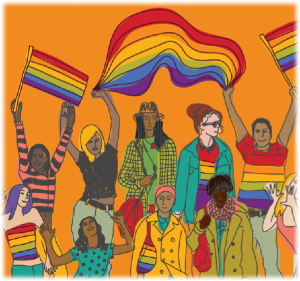 As adults who identify as LGBTQ+ age, they face several unique and challenging issues related to older adulthood, leading to social, economic, and health disparities. A recent national study found that aging adults in the LGBTQ+ community face greater levels of depression, loneliness, disability and social isolation, putting this population at increased risk for mental and physical health conditions. These findings are consistent with a growing number of studies demonstrating the health impact of the systemic oppression of the LGBTQ+ community as individuals reach older age. The “shifting contexts” of aging adults identifying as LGBTQ+ leave many older individuals vulnerable to a variety of health and social issues. As the circumstances of daily living, social life, and healthcare change throughout older age, adults in the LGBTQ+ community face fewer opportunities to maintain their health and greater barriers to achieving well-being.
As adults who identify as LGBTQ+ age, they face several unique and challenging issues related to older adulthood, leading to social, economic, and health disparities. A recent national study found that aging adults in the LGBTQ+ community face greater levels of depression, loneliness, disability and social isolation, putting this population at increased risk for mental and physical health conditions. These findings are consistent with a growing number of studies demonstrating the health impact of the systemic oppression of the LGBTQ+ community as individuals reach older age. The “shifting contexts” of aging adults identifying as LGBTQ+ leave many older individuals vulnerable to a variety of health and social issues. As the circumstances of daily living, social life, and healthcare change throughout older age, adults in the LGBTQ+ community face fewer opportunities to maintain their health and greater barriers to achieving well-being.
Aging adults who identify as LGBTQ+ are less likely to be partnered or married or have children, leading to fewer options for social support, financial assistance, and caregiving when compared with their heterosexual peers. Older adults in the LGBTQ+ community not only have histories of victimization and discrimination, but also fear further discrimination by healthcare professionals, caregivers, and service providers; this can result in concealing one’s sexual orientation and/or gender identity, or being “pushed back in the closet”.
As these issues are reflective of the historic discrimination, stress, and trauma facing the LGBTQ+ community, addressing them represents a critical social justice concern. It is imperative older adults who identify as LGBTQ+ access care that is restorative and trauma informed, taking place within safe and affirming environments. Moreover, older adults identifying as LGBTQ+ deserve to age with dignity, with opportunities for meaningful social interaction and enrichment. However, research, policies, and solutions that address these concerns are still lacking. Though much action is needed to ensure equal rights for adults in the LGBTQ+ community as they age, these organizations and resources currently support older adults who identify as LGBTQ+:
- SAGE - the country’s largest and oldest organization dedicated to improving the lives of older adults who identify as lesbian, gay, bisexual and transgender (LGBT)
- National Resource Center on LGBT Aging - the country's first and only technical assistance resource center aimed at improving the quality of services and supports offered to older adults who are lesbian, gay, bisexual and/or transgender
- Movement Advancement Project (MAP) - independent think tank that provides rigorous research, insight, and analysis that help speed equality for the LGBT community
Learn more about aging adults in the LGBTQ+ community and how you can incorporate health and aging issues facing this population within your research, practice, and policy work by reading this report published by SAGE and MAP.
References:
https://www.theatlantic.com/health/archive/2016/08/lgbt-seniors/497324/
https://www.ncbi.nlm.nih.gov/pmc/articles/PMC5373809/#:~:text=Fredriksen%2DGoldsen%20and%20Emlet%20
https://academic.oup.com/ppar/article/28/1/24/4958396?login=true
https://healthjournalism.org/blog/2018/07/national-study-finds-lgbt-seniors-face-tougher-old-age/
https://www.lgbtmap.org/file/understanding-issues-facing-lgbt-older-adults.pd
